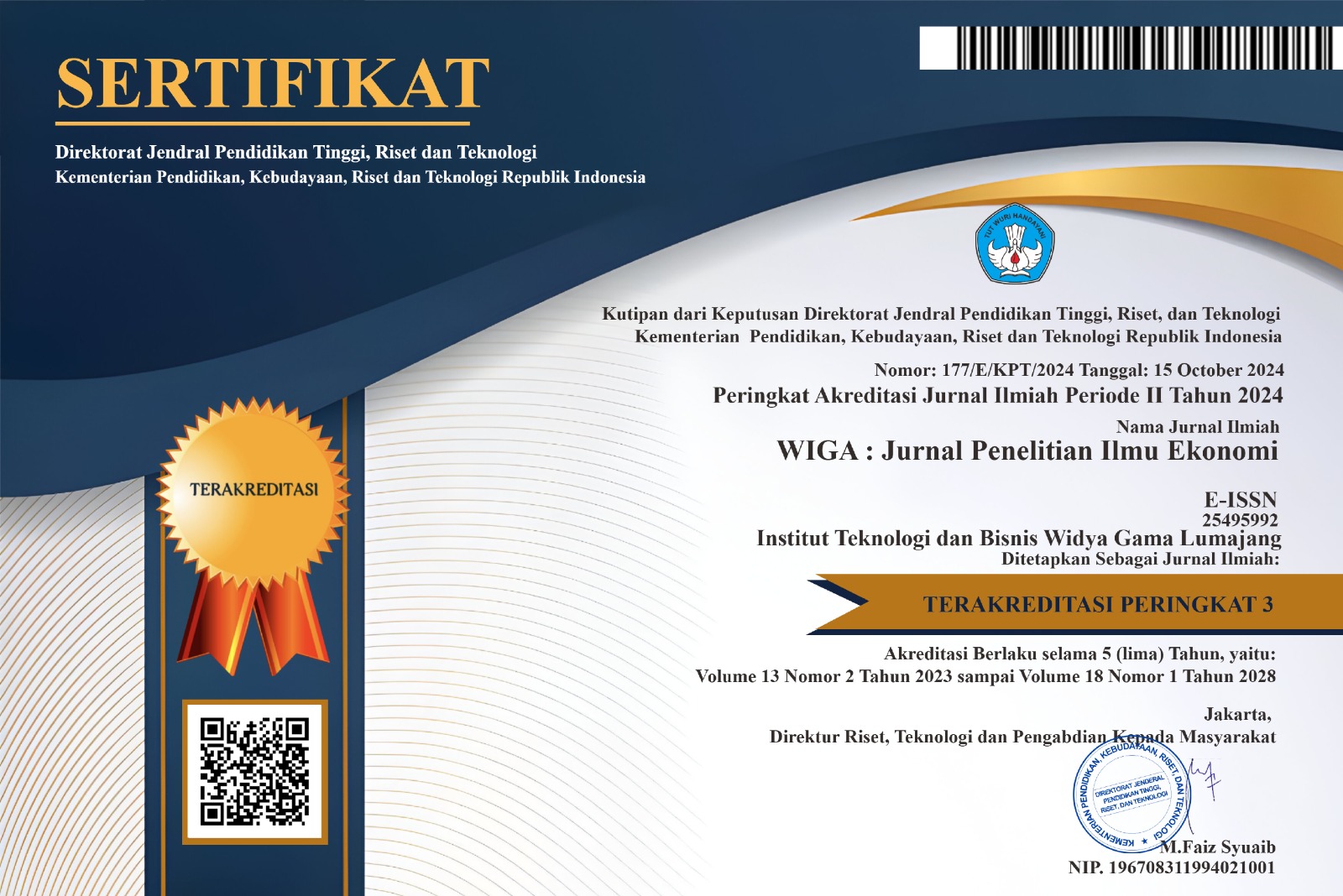Tunneling Related Party Lending Phenomenon: Empirical Study on Family Business in Indonesia
DOI:
https://doi.org/10.30741/wiga.v11i1.651Keywords:
loans, RPT, auditors, independentAbstract
This study examines the effect of family end control with a pyramid structure, RPTs disclosure, internal auditors and independent commissioners on related loan tunneling in Indonesia. This study used a sample of 258 public companies listed on the Indonesia Stock Exchange from 2016-2018. This study provides empirical evidence that the final controller of the family with a pyramid structure is proven to practice tunneling through related loans. The next finding of this study is that the level of disclosure of related transactions can reduce the potential for the practice of tunneling related loans. Another important finding is the failure of the internal control mechanism by internal auditors and independent commissioners which is not able to reduce the potential for related loan tunneling practices in family companies in Indonesia.
Downloads
References
Achmad, T. (2008). Concentrated Family Ownership Structures Weakening Corporate Governance: A Developing Country Story, The Case of Indonesia Companies. Jurnal Manajemen Akuntansi & Sistem Informasi, 8 (2): 118-134.
Aharony, J., J. Wang, dan H. Yuan. (2010). Tunneling as an Incentive for Earnings Management During The IPO Process in China. Journal of Accounting and Public Policy, 29 (1):1-26.
Balyuk, Tetyana. (2014). An Empirical Study of Related-Party Lending. Available at SSRN: https://ssrn.com/abstract=2803750.
Claessens, S., S. Djankov, L. Klapper. (2003). Resolution of Crporate Distress in East Asia. Journal of Empirical Finance, 10: 199-216.
Claessens, S., S. Djankov, dan L.H.P. Lang. (2000). The Separation of Ownership and Control in East Asian Corporations. Journal of Financial Economics, 58 (1-2): 81-112.
Chen, Y., C-H. Chen, dan W. Chen. (2009). The Impact of Related Party Transactions on the Operational Performance of Listed Companies in China. Journal of Economic Policy Reform, 12 (4): 285-297.
Djankov, S., R. La Porta, F. Lopez-de-Silanes, dan A. Shleifer. (2008). The Law and Economics of Self-Dealing. Journal of financial economics, 88 (3): 430-465.
Faccio, M., dan L.H.P. Lang. (2002). The Ultimate Ownership of Western European Corporations. Journal of Financial Economics, 65(3): 365-395.
Gao, L., dan G. Kling. (2008). Corporate Governance and Tunneling: Empirical Evidence from China. Pacific-Basin Finance Journal, 16 (5): 591-605.
Gilson, R., dan J.N. Gordon. (2003). Controlling Controlling Shareholders. University of Pennsylvania Law Review, 15 (2): 785-850.
Guo, F. (2012). Related Lending Evidence of Tunnelling and Propping in China. Working Paper. School of Economics and Finance, Australia: Curtin University of Technology.
Hastori. S.H,; R. Sembel; dan T.N.A Maulana. (2015). Agency Costs, Corporate Governance and Ownership Concentration: The Case of Agro-industrial Companies in Indonesia. Asian Social Science, 11 (18): 311-319.
Hwang, C. Y., S. Zhang, and Y. Zhu. (2010). Related Party Transactions in China Before and After the Share Structure Reform. China Accounting and Finance Review International Symposium, Nanjing, China,
International Profesional Practice Framework (IPPF). (2017). Greenwood Blvd, Suite 401 Lake Mary, FL 32746 USA.
Jensen, M., dan W. Meckling. (1976). Theory of The Firm: Managerial Behaviour, Agency Costs and Ownership Structure. Journal of Financial Economics, 3 (4): 305-360.
Juvita, D., dan S.V. Siregar. (2015). Pengaruh Corporate Governance terhadap Hubungan Besaran dan Pengungkapan Transaksi Pihak Berelasi dengan Manajemen Laba : Studi Empiris Perubahan PSAK no 7, Jurnal Akuntansi dan Auditing 10 (1) : 45 – 67.
Johnson, S., R. La Porta, F. Lopez-de-Silanez, dan A. Shleifer. (2000). Tunneling. American Economic Review, 90 (2): 22-27.
Juliarto, A. (2012). Tunneling: Related Party Transactions of ASEAN Listed Firms. Doctoral Thesis, Australia: Curtin University of Technology, Perth.
Jian, M., dan T.J. Wong. (2003). Earnings Management and Tunneling Through Related Party Transactions: Evidence from Chinese Corporate Groups. Working Paper. Hong Kong: University of Science and Technology.
Khanna, T., dan K. Palepu. (2000). Emerging Market Business Groups, Foreign Intermediaries, and Corporate Governance. Concentrated corporate ownership. Chicago, Illinois, U.S.A: University of Chicago Press.
Li. ZQ., Z. Sun, dan ZW. Wang. (2004). Tunneling and Ownership Structure of a Firm: Evidence from Controlling Shareholder's Embezzlement of listed Companies' Funds in China. Account Review, 12: 3–13.
Li, G. (2010). The Pervasiveness and Severity of Tunneling by Controlling Shareholders in China. China Economic Review, 21 (2): 310-323.
La Porta, R., F. Lopez-de-Silanes, dan A. Shleifer. (1999). Corporate Ownership Around the World. Journal of Finance, 54 (2): 471-517.
__________, _____________, ___________, dan R.W. Vishny. (2000). Investor protection and corporate governance. Journal of Financial Economics, 58 (1-2): 3-27.
Liu, Q., dan Z. Lu. (2007). Corporate governance and earnings management in the Chinese listed companies: A tunneling perspective. Journal of Corporate Finance, 13(5): 881-906.
______., dan Tian. (2012). Controlling Shareholders Expropriation and Firms Leverage Decision: Evidence from Chinese Non-Tradable Share Reform. Journal of Corporate Finance, 18(4): 782–803.
Nugroho, N.E., Rahmawati., Bandi, dan A.N. Probohudono. (2020).Tunneling pinjaman berelasi: studi empiris pada perusahaan keluarga di Indonesia. Disertasi. Universitas Sebelas Maret Indonesia.
Peraturan Otoritas Jasa Keuangan POJK No. 33/POJK.04/2014
Peraturan Otoritas Jasa Keuangan POJK No. 56/POJK.04/2015 bahwa batas minimal auditor internal perusahaan publik adalah 1 orang auditor.
Shan, Y. G. (2012). Can Internal Governance Mechanisms Prevent Asset Appropriation? Examination of Type I Tunneling in China. Financial Markets and Corporate Governance Conference.
Tong, Y., W. Mingzhu, dan X. Feng. (2014). Internal Control, Related Party Transactions and Corporate Value of Enterprises Directly Controlled by Chinese Central Government. Journal of Chinese Management, 1 (1): 1-14.
Utama, C.A., dan S. Utama. (2013). Corporate Governance, Size and Disclosure of Related Party Transactions, and Firm Value: Indonesia Evidence, International Journal of Disclosure and Governance 11 : 341–365.
Undang-Undang No.40 tahun 2007 tentang Perseroan Terbatas
Villalonga, B., dan R. Amit. (2006). How do Family Ownership, Control, and Management Affect Firm Value? Journal of Financial Economics, 80(2): 385-417.
Wiwattanakantang, Y. (2000). The Equity Ownership Structure of Thai Firms. Working Paper, Kunitachi, Tokyo: Hitotsubashi University.
Downloads
Published
How to Cite
Issue
Section
License
Copyright (c) 2021 Ign. Novie Endi Nugroho, Rahmawati, Bandi, Agung Nur Probohudono

This work is licensed under a Creative Commons Attribution-ShareAlike 4.0 International License.










